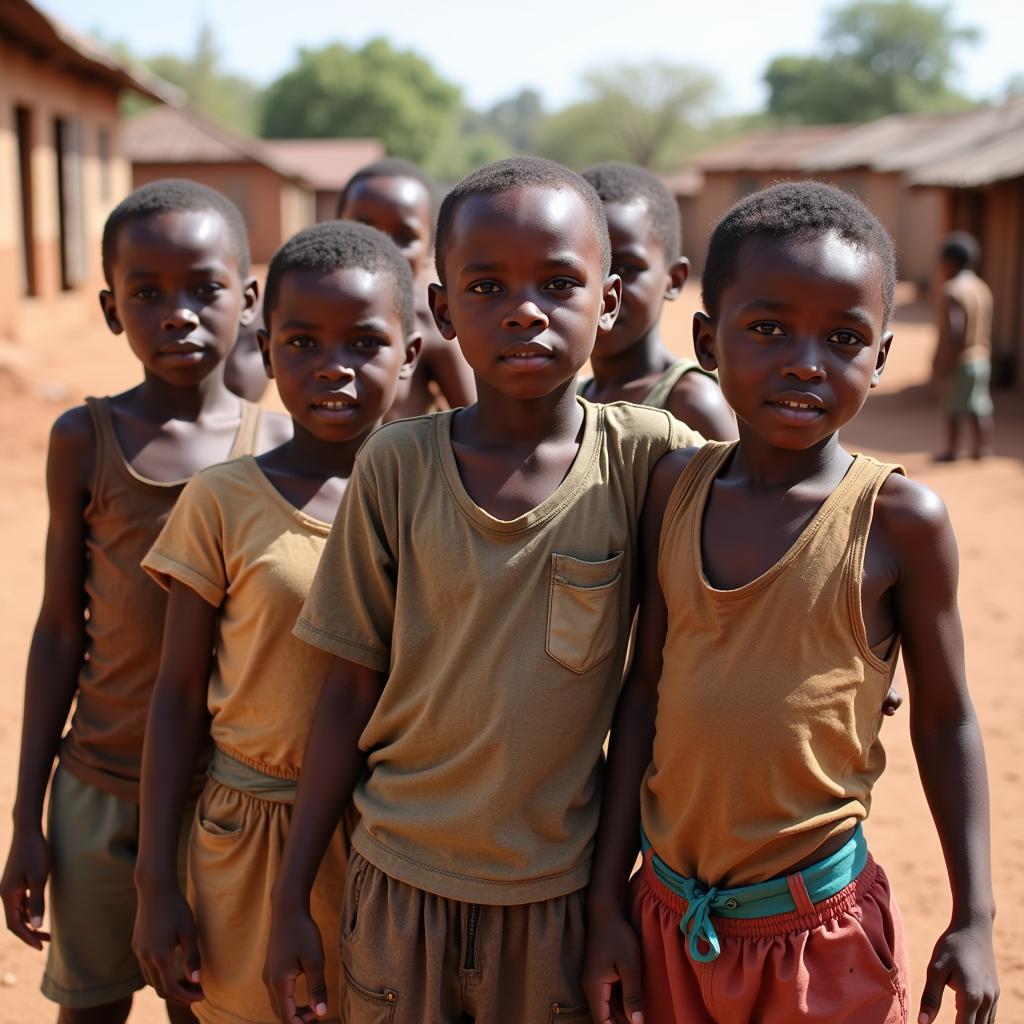The Haunting Image: African Child and Vulture
The iconic and disturbing photograph of an African Child And Vulture, taken by Kevin Carter in 1993, continues to spark debate and raise complex questions about famine, poverty, and the role of photojournalism in Africa. This image, forever etched in our collective memory, serves as a stark reminder of the devastating realities faced by vulnerable populations.
Understanding the Context of “African Child and Vulture”
The “African Child and Vulture” photo, often misinterpreted, requires a deeper understanding of its historical and social context. Taken during the Sudanese famine, the image captured a young child, weakened by hunger, struggling to reach a United Nations feeding center. A vulture lurks nearby, a chilling symbol of impending death. See more on this impactful photo: african child and vulture photo.
The photograph immediately garnered international attention, winning the Pulitzer Prize and sparking a global conversation about the ethics of photojournalism. Many criticized Carter for not intervening, questioning his humanity and the role of a journalist in such situations. The intense scrutiny and criticism tragically contributed to Carter’s suicide just months after receiving the award.
The Impact and Legacy of the Photograph
While the controversy surrounding Carter’s actions remains, the “African Child and Vulture” picture undeniably raised awareness about the devastating impact of famine in Africa. It forced the world to confront the harsh realities faced by countless children and prompted increased humanitarian aid to the region. The photograph also ignited a crucial discussion about journalistic ethics and the responsibility of bearing witness to suffering. You can view this harrowing image here: african child and vulture picture.
How did the “African Child and Vulture” photo impact humanitarian aid?
The photograph’s publication led to a surge in donations and aid to famine-stricken regions in Africa, highlighting the power of visual storytelling in galvanizing public support.
Beyond the Single Frame: Exploring Child Welfare in Africa
Beyond the single frame of the “African Child and Vulture” photograph, lies a broader narrative of child welfare in Africa. The image serves as a gateway to understanding the complex challenges facing children across the continent, including poverty, malnutrition, lack of access to education and healthcare, and the impact of conflict and displacement.
 African Child Poverty Challenges
African Child Poverty Challenges
What are the main challenges facing African children today?
Poverty, lack of access to education and healthcare, and the impact of conflict and displacement are among the biggest challenges.
How can we contribute to improving child welfare in Africa?
Supporting organizations working on the ground, advocating for policy changes, and raising awareness are crucial steps.
Misconceptions and Interpretations
It’s important to address the common misconceptions surrounding the “African Child and Vulture” image. Carter’s actions were scrutinized, but later reports indicated the child survived and reached the feeding center. The vulture was waiting for scraps from the center, a common occurrence. While the image remains powerful and disturbing, understanding the full story is critical. More details about this situation can be found at african kid dying vulture.
Dr. Amina Omar, a prominent sociologist specializing in African studies, notes, “The ‘African Child and Vulture’ photo, while tragic, should not define the African narrative. It’s crucial to acknowledge the resilience, strength, and vibrant cultures that exist across the continent.”
Professor Kwame Nkrumah, a renowned historian specializing in African history, adds, “The image serves as a powerful reminder of the need for sustained efforts to address poverty and inequality, but it’s equally important to celebrate the rich tapestry of African life and the progress being made.”
The Future of a Continent: Hope and Progress
The “African Child and Vulture” photo, though haunting, serves as a call to action. It reminds us of the ongoing struggle against poverty and the importance of humanitarian efforts. However, it’s equally important to recognize the positive strides being made in Africa, the vibrant cultures, the spirit of innovation, and the unwavering resilience of its people. For more captivating images capturing the diverse facets of African childhood, see african child photo.
The “African Child and Vulture” story encourages us to look beyond the single frame and engage with the complexities of African life. It’s a call to understand, to contribute, and to support the ongoing journey towards a brighter future for all African children. If you are looking for delicious and authentic African food nearby, you might want to check out this resource: african food nearby.
In conclusion, the “African Child and Vulture” photo remains a potent symbol of suffering and a catalyst for change. It compels us to confront difficult questions, to engage with the complexities of African Life, and to work towards a future where every child has the opportunity to thrive.
FAQ
- Who took the “African Child and Vulture” photo? Kevin Carter.
- When was the photo taken? 1993.
- Where was the photo taken? Sudan.
- What prize did the photo win? The Pulitzer Prize.
- What controversy surrounds the photo? The photographer’s decision not to intervene.
- What is the significance of the vulture in the photo? It symbolizes impending death and the harsh realities of famine.
- Did the child in the photo survive? Reports indicate the child did survive and reach the feeding center.
Common Scenarios:
- Scenario 1: A student is researching the impact of photojournalism on public perception of humanitarian crises.
- Scenario 2: A teacher is using the image to facilitate a classroom discussion about ethics and responsibility.
- Scenario 3: An individual is seeking information about the context and background of the photo.
Suggested Further Reading:
- Articles on the ethics of photojournalism
- Resources on famine relief efforts in Africa
- Studies on child welfare in developing countries
When you need support, please contact Phone Number: +255768904061, Email: [email protected] Or visit: Mbarali DC Mawindi, Kangaga, Tanzania. We have a 24/7 customer service team.

